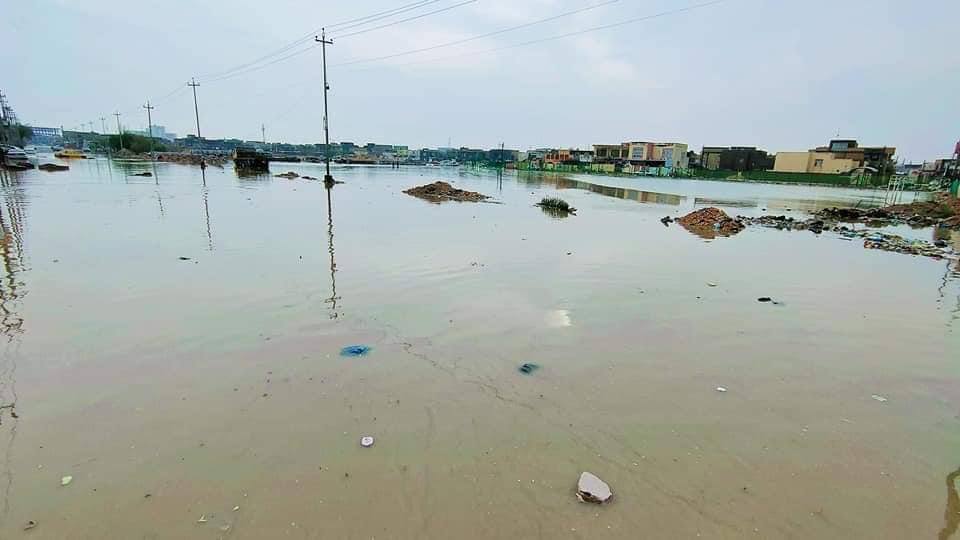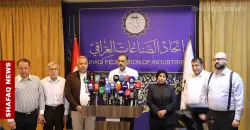Southern Iraq ravaged by floods amidst infrastructural decay and corruption allegations

Shafaq News / A series of torrential downpours have battered several Iraqi governorates, resulting in extensive flooding of various neighborhoods and areas, including the long-suffering region of al-Diwaniyah in southern Iraq.
The “beleaguered” governorate has been grappling with deteriorating infrastructure and a lack of development for the past decade, further compounded by a slew of corruption allegations against local officials. Adding to the predicament, the companies responsible for maintaining the sewage and rain networks have failed to deliver the necessary outcomes over the past ten years, leaving the area particularly vulnerable to the ongoing deluge.
A statement from governor Maytham al-Shahad's office confirmed that the governorate had to suspend the official working hours of all departments and institutions on Monday, Tuesday, and Wednesday, except for essential services and school administrations. The move is aimed at focusing on ongoing efforts to prepare school buildings for the upcoming academic year.
"The infrastructure in central and southern governorates, including al-Diwaniyah, has remained the same for 20 years, hence the sewage networks' incapacity to withstand the recent rainfall," said MP Bassem al-Gharabi. He further elaborated that the previous local governments had demonstrated their inability to address the issue, particularly the most recent governor, who was removed from office and charged with financial and administrative corruption, similar to his predecessors.
Furthermore, the frequent changes in departmental directors, particularly in the municipal and sewage sectors, have created numerous difficulties in delivering services, compounded by a shortage of staff and decrepit equipment, as per al-Gharabi.
Al-Gharabi noted that given the current capacities, the flooding issue in his governorate is likely to persist for another week. He emphasized the need for "coordination to deploy equipment from other governorates to drain rainwater."
The issue of flooding in several Iraqi governorates has laid bare the inadequacy of the corporations responsible for sewage and rain network maintenance.
Al-Gharabi disclosed that two companies, Al-Rafidain Company and Noor al-Ufuq, tasked with sewage projects in al-Diwaniyah, have failed to deliver the necessary results. Al-Rafidain Company has been ineffective since 2011 and has been charged with financial and administrative corruption, eventually leading to bankruptcy and the imprisonment of many of its engineers. Likewise, Noor al-Ufuq, which acquired Al-Rafidain's shares, is also falling behind and subject to numerous complaints.
He stressed the urgency of completing Noor al-Ufuq's projects and extended an invitation to the Minister of Construction and Housing to visit al-Diwaniyah and address the sewage file. He emphasized that without immediate attention to this issue, no solution would be feasible for the governorate.
In the meantime, the inadequacies of civil defense measures have compounded the predicament. Since last Sunday, civil defense centers have been mobilized in Baghdad and other governorates to address the flooding situation.
Brigadier General Jawdat Abdul Rahman, the director of relations and media for the Civil Defense Directorate, confirmed that the recent heavy rainfall and bad weather conditions were concentrated in several governorates, including Baghdad, Wasit, Najaf, al-Diwaniyah, al-Anbar, and Nineveh. Despite the challenges, all civil defense teams worked according to a pre-drawn plan to drain the flooding water and facilitate citizens' movement.
However, the Civil Defense Directorate is still waiting for information from the Meteorological and Seismic Monitoring Authority to act swiftly if there is another wave of rain.
Abu Ali has described the infrastructure and sewage situation in the governorate as "horrible," highlighting the lack of significant achievements by successive local governments that have led to citizens' properties drowning and damaged, with students affected due to continuous school suspensions.
He urged the new local administration to implement reforms to ease the burden on citizens, including compensating them for the damage caused by the rains and the resulting submergence of their homes and properties. He also raised questions about the food security law's fate, previous budgets, and the chapters for their disbursement.
With heavy rainfall still causing destruction in various Iraqi governorates, the living conditions of residents have become increasingly perilous. Meanwhile, the government's failure to address the deficient infrastructure and sewage networks has resulted in leaving numerous citizens vulnerable to extensive water damage and flooding.





